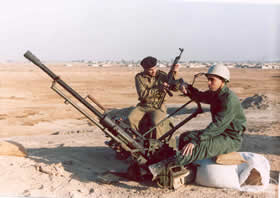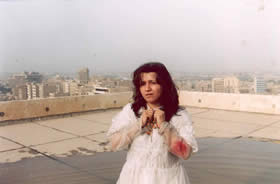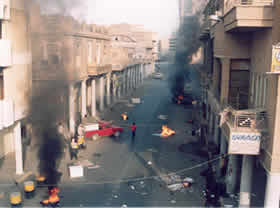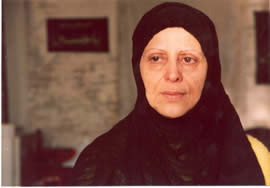 A conventional review of the film Ahlaam is almost impossible. Ahlaam is more than just a movie; it is an anatomy of an open wound. It is about the ongoing pain of a nation and made by a film crew that has been shot at, injured, imprisoned, kidnapped, and tortured. Amazingly, the struggles endured by the filmmakers parallel those plaguing the Iraqi people.
A conventional review of the film Ahlaam is almost impossible. Ahlaam is more than just a movie; it is an anatomy of an open wound. It is about the ongoing pain of a nation and made by a film crew that has been shot at, injured, imprisoned, kidnapped, and tortured. Amazingly, the struggles endured by the filmmakers parallel those plaguing the Iraqi people. How could I complain about the filmmaking issues in Ahlaam when the creation and completion of the film is a feat within itself? A comparison makes it a lot easier to understand: Michael Moore created Fahrenheit 911 and in the film he criticized the authorities to the extreme and accused the U.S. government of waging the Iraq war for their own financial interests; but Michael Moore never got arrested, kidnapped, or tortured for his work. The only pain Moore had to endure involved tasteless jokes from the likes of Rush Limbaugh, mocking him on their radio
 shows. Mohamed Al Daradji, creator of Ahlaam, was arrested during the shooting of Ahlaam and was accused of being a spy. Ahlaam was made under the daily bombardment of Baghdad and the insurgent’s attacks. When most of the city had no electricity, the Ahlaam crew had no access to the basic equipment needed to make a decent film and the only camera they had was an ancient one: saved from Baghdad’s lootings.
shows. Mohamed Al Daradji, creator of Ahlaam, was arrested during the shooting of Ahlaam and was accused of being a spy. Ahlaam was made under the daily bombardment of Baghdad and the insurgent’s attacks. When most of the city had no electricity, the Ahlaam crew had no access to the basic equipment needed to make a decent film and the only camera they had was an ancient one: saved from Baghdad’s lootings. Ahlaam focuses on the story of three Iraqis whose lives change forever under Saddam Hussein. Ahlaam is one of the three. On her wedding day she witnesses the violent arrest of her fiancé. Left with little hope and only a dream, she becomes disillusioned and is confined to a Baghdad psychiatric asylum where Dr. Medhi, an accomplished physician, is forced to work because of his father’s political past.
 Ali is a soldier who becomes irreversibly traumatized by the bombing of Iraq in 1998. Following the American invasion in 2003, confusion, uncertainty, and death surrounded the damaged asylum. Ali’s fearless insanity becomes Dr. Medhi’s only hope to recover surviving patients as Ahlaam is left to wander the terrorized streets of Baghdad searching for her lost love.
Ali is a soldier who becomes irreversibly traumatized by the bombing of Iraq in 1998. Following the American invasion in 2003, confusion, uncertainty, and death surrounded the damaged asylum. Ali’s fearless insanity becomes Dr. Medhi’s only hope to recover surviving patients as Ahlaam is left to wander the terrorized streets of Baghdad searching for her lost love. The first few sequences in Ahlaam show the life under Sadam Hussein’s dictatorship and in just a few instances the movie falls into the level of a melodrama and distances itself from the simple and sharp language of the story. But from the Ahlaam’s wedding sequence—where her future husband is picked up by Saddam’s secret police—to the end of the movie, the story takes on an excellent flow.
The brilliant documentary’s visuals shock audiences and provide them with ever-increasing surprises.
Ahlaam does not speak about possible conspiracy theories, but shows the brutal facts of daily life in Baghdad. Mohmad Al Daradji, the young director of Ahlaam, cleverly takes no sides and leaves a conclusion up to the
 audience.
audience. In the last scene of the movie, Ahlaam is seen wandering around a building that is surrounded by American forces and her life is clearly at risk. The last shot focuses on Ahlaam’s face, holding a sad and lost look. Nobody can foresee what may happen to her, but we all know that it is almost impossible to save her. Isn’t this the story of Ahlaam’s country as well?
Iraq 110 minutes
DIRECTOR: Mohamed Al Daradji
SCREENWRITER: Mohamed Al Daradji
CAST: Aseel Adel, Bashir Al Majid, Mohamed Hashim
Santa Barbara International Film Festival: http://www.edhat.com/sbfilm007/onemovie.cfm?onetitle=Ahlaam
